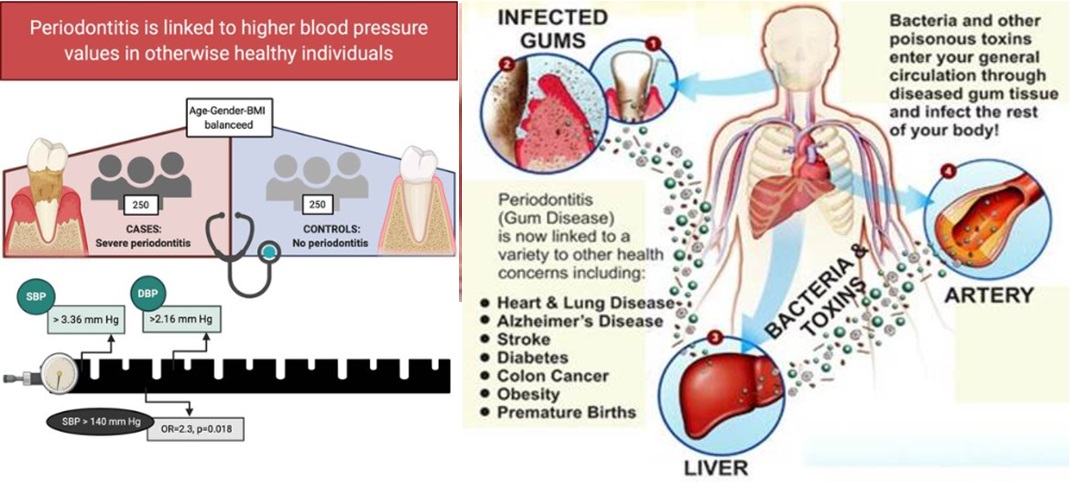
Hypertension, commonly known as high blood pressure, is a chronic medical condition that affects a significant portion of the global population. While the primary focus of hypertension is often on its impact on cardiovascular health, it is important to recognize that it can also have implications for dental health.
Causes and Risk Factors: Hypertension can develop due to a variety of factors, including genetics, lifestyle choices, and underlying medical conditions. Some common causes and risk factors for hypertension include:
• Obesity: Being overweight or obese increases the risk of developing hypertension.
• Poor diet: A diet high in sodium, saturated fats, and processed foods can contribute to the development of hypertension.
• Smoking: Tobacco use, including smoking cigarettes or chewing tobacco, can elevate blood pressure levels.
• Stress: Chronic stress can contribute to the development of hypertension.
• Age: The risk of hypertension increases with age, as blood vessels become less flexible.
• Family history: Having a family history of hypertension can increase an individual's susceptibility to the condition.
• Lack of physical activity
Symptoms of Hypertension: Hypertension is often called the "silent killer" because it frequently presents no symptoms. However, in some cases, people may experience symptoms such as:
• Headaches
• Shortness of breath
• Chest pain
• Fatigue
• Vision problems
• Irregular heartbeat
If you experience any of these symptoms, it is important to seek medical attention immediately.
Relation between Hypertension and Dental Issues
There is a growing body of evidence to suggest that hypertension is linked to a variety of dental issues, including:
• Gum disease: Hypertension can damage the blood vessels in the gums, making them more susceptible to infection and inflammation. This can lead to gum disease, which is a major cause of tooth loss in adults.
• Dry mouth: Some medications used to treat hypertension can cause dry mouth, which can increase the risk of cavities and other dental problems.
• Tooth loss: Hypertension can contribute to tooth loss by causing damage to the blood vessels in the gums and weakening the bone that supports the teeth.
• Oral infections: People with hypertension may be more susceptible to oral infections, which can lead to abscesses and other serious dental problems.
• Poor wound healing: Hypertension can impact the body's ability to heal, which may have implications for dental procedures such as extractions or implant placements. It is important to inform your dentist about your hypertension and any medications you are taking to ensure appropriate precautions are taken.
Treatment Options
The treatment of hypertension depends on the severity of the condition and the presence of other medical conditions. Lifestyle changes, such as maintaining a healthy weight, exercising regularly, and reducing sodium intake, can help to lower blood pressure. In some cases, medications may be necessary, including:
• Diuretics
• Beta-blockers
• ACE inhibitors
• Calcium channel blockers
If you have hypertension, it is important to let your dentist know so they can take any necessary precautions during dental procedures. They may recommend antibiotics before certain procedures to prevent infections or suggest avoiding certain medications that can cause dry mouth.
Maintaining Oral Health with Hypertension
While hypertension can potentially impact dental health, there are several measures individuals with hypertension can take to maintain good oral health:
• Regular dental visits: It is important to maintain regular dental check-ups and cleanings to monitor oral health and address any issues promptly.
• Good oral hygiene: Brushing teeth at least twice a day with a fluoride toothpaste and flossing daily can help prevent tooth decay and gum disease.
• Medication management: If you are taking medication for hypertension, inform your dentist about the specific drugs you are using. This will help them provide appropriate dental care and make any necessary adjustments to treatment plans.
• Lifestyle modifications: Adopting a healthy lifestyle, including maintaining a balanced diet low in sodium, exercising regularly, managing stress, and quitting smoking, can contribute to better overall health, including oral health.
Conclusion
While the relationship between hypertension and dental issues is still being studied, it is important to recognize that hypertension may have implications for oral health. Individuals with hypertension should be aware of the potential impact on dental health and take appropriate measures to maintain good oral hygiene and communicate effectively with their dental healthcare providers. By practicing good oral hygiene, attending regular dental check-ups, and managing hypertension effectively, individuals can work towards maintaining optimal oral health.
Our Doctors
SMILE IN MINUTES Dental Care Doctors

Dr. Priyanka
Sr. Dental Surgeon

Dr. Mowmita Barik
Dental Surgeon (BDS)

Dr. Sapna
Dental Surgeon (BDS)

Dr. Md. Shoaib
Dental Surgeon (BDS)

Dr. Rubiya
Dental Surgeon (BDS)

Dr. Kuldeep
Dental Surgeon (BDS)

Dr. Ribhu
Dental Surgeon (BDS)

Dr. Sonam Tonger
Dental Surgeon (BDS)

Dr. Chanderalata
Dental Surgeon (BDS)

Dr. Neha
Dental Surgeon (BDS)

Dr. Priyanka Arora Sethi
Dental Surgeon (BDS)



